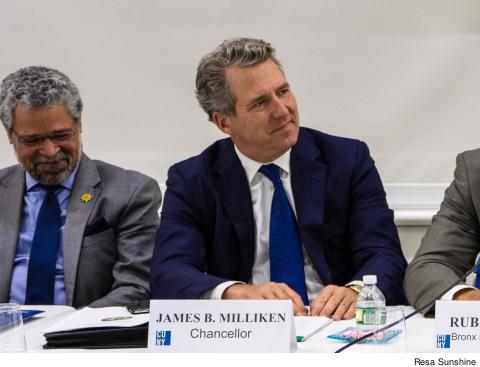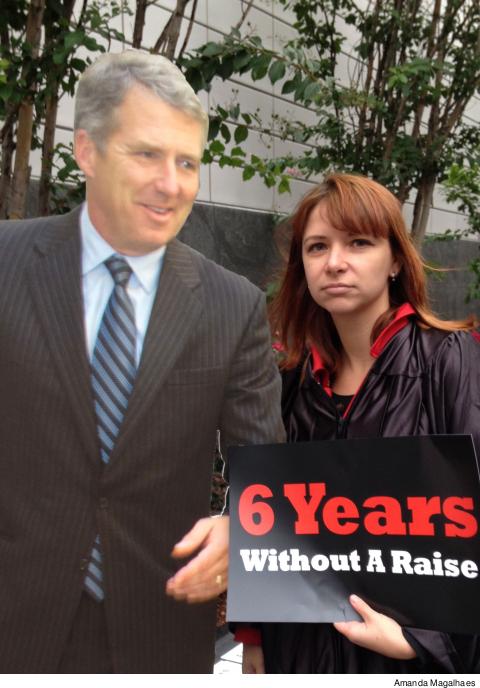Chancellor steps down in 2018.
 |
James B. Milliken’s four years as CUNY chancellor will be remembered for tense relations between the university and the union, as his administration continued what the PSC called an “austerity” regime for one of the nation’s most prominent public institutions of higher education. While his tenure includes other areas of progress, he leaves without making a profound mark on the direction of CUNY.
Milliken, 60, announced in November that he will be stepping down at the end of the academic year. The former University of Nebraska president has indicated he may stay at CUNY as a law professor.
ACCOMPLISHMENTS
For his part, Milliken said that CUNY accomplished many of his goals under his administration. “Our community colleges are on track to double their graduation rates, making them national leaders. We have launched a new school of medicine, almost certainly the most diverse in the country, and a successful independent school of public health,” he said in a statement. “We put in place exciting new initiatives to diversify the arts institutions in New York, provide groundbreaking comprehensive support for foster youth, increase women and minorities in tech, and much more.”
As several media outlets noted, Milliken’s administration benefitted from increased city funding for CUNY, which allowed greater investment in community colleges.
Milliken became chancellor when the PSC contract was already four years overdue. After a year of failing to secure the funds necessary to make an economic offer to the union, the PSC stepped up its campaign and mounted enough pressure to force an offer in 2015. Union leaders were critical again when Milliken offered only muted public opposition to the $485-million reduction in state funding for CUNY proposed by Governor Andrew Cuomo in 2016. Only after a nearly unanimous strike authorization vote taken later that year did CUNY finally come to the table with acceptable raises and back pay, allowing the contract to be settled.
EXORBITANT SALARY
While many adjuncts cobble together a living with poverty wages, Milliken, whose salary clocks in at $670,000 annually ($180,000 more than the previous chancellor), has received a nearly $18,000-per-month housing allowance from CUNY for his luxurious Upper East Side rental apartment. For PSC members and CUNY advocates, these numbers represented a tale of two CUNYs that saw an increasing number of managers paid high salaries while faculty and staff salaries stagnated and student tuition at senior colleges increased.
 |
Milliken’s eventual departure comes at an uncertain time for the university. As this newspaper went to press, it was still unclear whether the governor would sign legislation passed this year that would release state funds for physical maintenance of campuses and set aside money for collective bargaining, easing the strain on the CUNY budget.
STATE IG REPORT
CUNY and its advocates are also awaiting a final state inspector general’s report on alleged financial improprieties at the university. Initial findings have already led to the resignation of one college president, Lisa Coico of City College, and a realignment of top CUNY administrative staff.
Milliken also leaves just as the PSC has set forth its contract demands and formally requested bargaining sessions to begin. The contract expired on November 30, and talks leading to the next collective bargaining agreement may well extend after Milliken steps down.
Above all, the union believes the next chancellor should be someone willing to lobby the governor for more state funding for public higher education and to work with the union in increasing investment in the university’s workforce without increasing tuition.
Despite the conflict generated by the long contract battle, union leaders acknowledged that the eventual settlement, approved by Milliken and the CUNY Board, included important provisions for which the union had fought for years: on the teaching load, HEO advancement and multiyear appointments for adjuncts.
STRONG POINTS
Milliken also received commendation for his efforts to support undocumented students, who have long been strongly supported by the PSC.
Above all, the union believes the next chancellor should be someone who will refuse to accept austerity funding for CUNY. Both Milliken and his predecessor, union leaders have said, simply managed scarcity, failing to offer an effective challenge to the notion that state investment in CUNY should decline every year while education suffers and students, staff and faculty pay the price.

